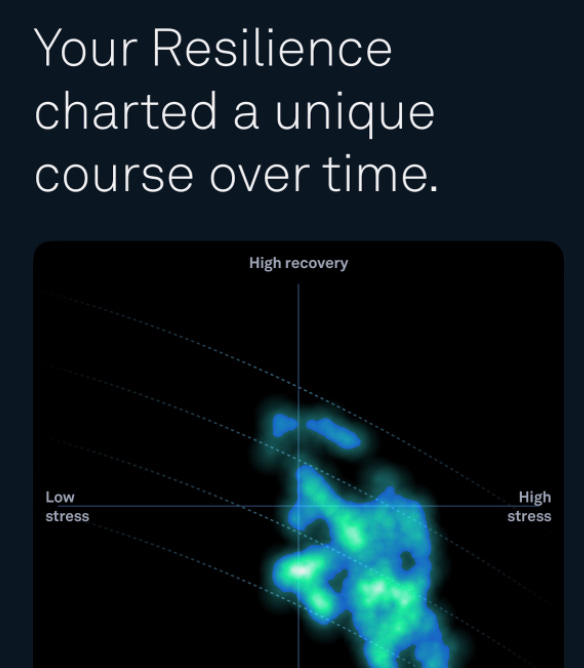Hi friends!
Last week I left you on an absolute CLIFFHANGER off the back of my Oura Ring review (pt 1).
Today I’m BACK to finish the review for real.
Part two covers:
What I don’t like about the right
What I’ve learnt from my Oura ring
Concluding remarks
Let’s dooooo iiiiiiitttt.
What I don’t like!
Daytime stress/restorative time
Daytime stress measures your physiological (physical and mental) stress responses, calculated using: HR, HRV, motion, and average body temperature.
Restorative Time is recorded when your ring detects that your heart rate variability (HRV) is up during the day.
HRV while I’m here = heart rate variability. Generally higher means body is less stressed.
Daytime stress is displayed in a graph that tracks your stress levels in 15 minute increments across a day. In theory, it shows you in what proportion of the day your body spent in a stress/engaged/relaxed/restored state.
That data can then inform how well you ‘recovered’ during the day, as well as help identify the behaviours that put you in a stressed vs restorative state.
To be honest, before I got my Oura ring I was really excited about this feature.
However! The reason I don’t like my daily stress graph is because it pretty much always tells me I’ve had a really stressful day, even when I genuinely don’t believe I have and have gone out of my way to try and have some downtime.
I also almost never get ‘restorative time’ and will often go for weeks with 0m of restorative time. I don’t actually feel this is reflective of my life - sometimes I’ll nap and it still won’t tell me I’ve had restorative time which is sooo annoying to me.
HOWEVER in researching for this blog post I have learnt something that has made this click a little bit more. On Oura’s website it says that this stress metric looks at how we adapt to internal and external factors, and an internal factor that it looks at is a lack of sleep.
So I guess this means that if you don’t have enough sleep then your body isn’t going to adapt very well to stress?
This makes sense in a way because Oura has told me many a-time that Tuesday is my most stressful day and I also know Monday night is my lowest average total sleep cause I get up extra early for my session.
It does annoy me that if you do poorly in one area (namely sleep) it impacts pretty much every other score. It feels kinda like doing badly on one part of a test and then every other section getting marked down because of it. Although I do recognise that’s sort of the point here.
I think at the end of the day I struggle with this measurement because I read it as emotional stress and I don’t like to be told I’m always stressed, because I don’t identify as someone who is always stressed.
Anyway I’ll stop writing about this now as I think this is getting increasingly unhinged (:
Lack of insight into exercise
I knew when I bought my Oura that it’s not built for amazing exercise insights but I didn’t realise that this essentially meant no insights. I find myself really wishing it could give me good insights into how hard I pushed in a session, or how that compared to other sessions, or how well I recovered, or anything really.
It does give me an ‘activity goal’, but I don’t understand how it sets that, and I generally can exceed it with just a 10 minute bike ride to work.
There is a setting you can switch on on your phone just before you start exercising that is meant to make the ring continue to monitor during the exercise.
I did this once or twice to start with but never really got anything useful, certainly not as much info as my Garmin gives me, and it’s too annoying to remember to do every time.
Alas.
Reports, AI & individual feedback
I can’t believe how poor the longer-term ‘reflective’ analysis and AI insights are.
This actually leads into a general annoyance with the ring and the data it gives you: it has taken me soooo long to get my head around it and understand what I should pay attention to and in what way.
I really wish the app did a little bit more of the heavy lifting for you (although perhaps there is also something there about learning to trust the data a little more/understand how it is reflected by what I do and in how I feel).
Oura gives me a monthly report that has exactly 0 useful information for me and it would be SO easy to make this useful.
My monthly reports will often say things like: ‘your resilience charted a unique course over time’ and ‘your stress and recovery levels moved with the beat of your life’ which feel far too horoscope-y for my liking.
Two things that I wish it did on this front:
Ask for more of my input - how do I actually feel, how is my mood, how much energy do I have, am I sick, did I get injured - essentially a journaling component that could massively level up the insights it gives and what I can learn
More comparison data - I think the other thing I really would love is for the data to tell me what is normal and what isn’t, or set clearer benchmarks for me in this sense. I would love to know how my metrics compare to other women my age, for example. I guess that is exactly what they don’t want us to do but I feel putting my data in the context of other’s data would make things so much easier to understand and triage. I find myself asking ‘is this normal??’ all the time.
What I’ve learnt from my Oura ring
At a high level, I guess the biggest thing you will learn are things you already know but maybe don’t apply: sleep is good, alcohol is bad, having restorative down time during the day if you’re exercising a lot is good, working too hard can be bad, moving each day is good.
This might all sound super intuitive but if you’re anything like me you won’t really remember that you haven’t been sleeping as much, or you’ve been training harder, or having a more stressful period at work.
These things all blend into a happy busy blur, and it’s not till I’m so deep in the exhaustion hole that I get sick for months straight (just for example) that I realise I’ve been asking too much of myself.
The Oura ring feels like a different/objective perspective into my health, particularly when it comes to recovery. It forces me to be realistic about the ongoing demands of my work, exercise and social life.
It’s the ultimate reminder that you cannot, in fact, ‘do it all’, that you have to make choices, that those choices are different for everyone.
On a really practical level, I’ve learnt that:
if I average less than 6 h 30 mins sleep a night for 2 weeks I am very likely to be sick by the end of it
long weekends are surprisingly great for my health
doing non-day-job work e.g. podcasting is different from relaxing, even if I find it really fun
having a relaxed conversation with someone I love is one of the few things that consistently puts me in the ‘restorative’ zone
oh and alcohol sucks
Concluding remarks
If you’re already really in tune with your body then you probably don’t need this (and well done) (and tell me your secrets).
If you don’t love diving into this kind of data, taking time to learn what the different metrics mean and how they’re measured, then you’re honestly not going to get that much value from the ring.
HOWEVER!
I do think that, as opposed to a lot of things you can spend money on in the wellness space, this is one that will continually remind you that the simple, basic things are 100x more important than the little 1%s that we can spend so much time worrying about.
And this, more than anything, is the true power of the ring (okayyy Tolkien): it keeps me focused on what matters, and it quantifies that which, to me, has previously felt unquantifiable.






